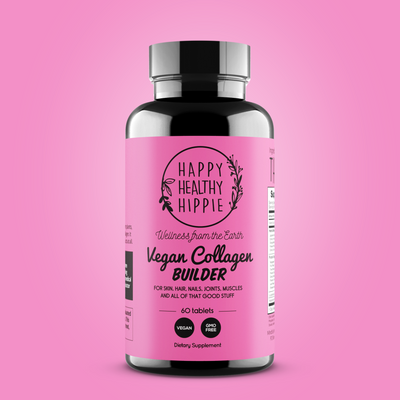![5 Ways to Boost Collagen Naturally [Science-Backed]](http://happyhealthyhippieco.com/cdn/shop/articles/featured-image_fa607ad5-c81f-4062-9a5d-6ef2c39eb008.jpg?v=1620317242)
From foods to facials, there are quite a few ways to boost collagen naturally in the body.
The fact is that collagen, an abundant protein in your body, is not just a skincare trend.
It’s an essential part of your body’s ability to do everything from maintaining bone density, to ensuring healthy joints, keeping the skin looking firm and elastic, and even promoting better cardiovascular health.
However, considering your body’s collagen levels “naturally” drop as you age, many people (rightfully) seek ways to naturally maintain their collagen levels when the body’s production drops.
Considering all these benefits, discovering science-backed ways to boost collagen naturally is definitely worth your while.
This article will show you 5 proven methods for boosting collagen production naturally.
What Is Collagen?
Walk into any drugstore’s cosmetics aisle and you’ll see products loudly and proudly marketing their “collagen-rich!” patented formula. Not all of these claims might be true, but one thing is certain:
Collagen plays a significant role in helping the skin maintain its elasticity or firmness.
But what is collagen?
Now that’s a question: About one-third of your body’s protein composition comes from collagen. It forms a crucial part of your body’s extracellular matrix (ECM), which is the structure that holds cells together.
If you were to examine this essential molecule up close, you’d see it’s shaped like an elongated triple helix. It primarily lives in the fibrous tissues of the body, including the skin, tendons, and ligaments.
So, by now, you’re probably seeing why collagen and skin health are connected (no pun intended).
It’s a molecule that, quite literally, helps you to move and holds you up. But it doesn't end here.
Because collagen plays such a crucial role in the formation and maintenance of the extracellular matrix, it also helps this structural component of cells initiate extremely important biochemical and biomechanical cues that are necessary for:
- Maintaining body equilibrium (also known as “homeostasis”)
- Tissue morphogenesis (how tissues take shape, based on how cells proliferate and die)
- Muscle recovery and repair (especially after strenuous exercise)
- The reduction of inflammation related to physical stressors on joints, connective tissues, and muscles
In other words, it’s in your best interest to keep collagen production steady, starting now!
When you boost collagen naturally, it’s like performing preventative maintenance for your car — it helps you stay well-oiled and running smoothly (so to speak) for years to come!
5 Ways to Boost Collagen Naturally
There are quite a few things you can do to boost collagen naturally — and none of them have to do with collagen creams.
That’s one thing you won’t find on our list of 5 ways to boost collagen naturally.
The fact is that collagen creams are unlikely to make much of a difference because collagen molecules are too large to be effectively absorbed through the skin.
However, you can use any of these 5 methods to support collagen production and it will make a noticeable and positive impact on your skin’s vitality and elasticity.
Let’s dive right in!
1) Take a Collagen Builder
Beauty comes from the inside, right? Or was it that beauty is skin deep?
Either way, both sayings are right.
That’s why we created the Vegan Collagen Builder.
It’s an all-natural, all-vegan collagen supplement that includes a carefully-selected blend of herbs, veggies, fruits, and minerals, all of which have been proven to boost collagen naturally in the body.
See, it’s not just about adding more collagen. It’s also about receiving supporting nutrients like silicone and vitamin C, which play a crucial role in stimulating the body’s natural collagen production.
That’s why you’ll find herbs like lemon balm and veggies like spinach in our formulation. In order to further support the growth of healthy hair, skin, and nails, you’ll also find that Vegan Collagen Builder boosts the production of keratin and elastin.
For more collagen sources, check out our extensive guide to 13+ vegan collagen sources!
2) Massage to Stimulate Collagen Production
Consider this a doctor’s order to introduce fitness for your face. Facial massages can bring several benefits to your skin, including draining the lymphatic system, contouring and detoxifying the skin, and releasing any excess fluids that cause puffiness.
Whether you choose to perform a facial massage with a roller, or you opt for using a method like Gua Sha, facial massages can help boost collagen naturally.
3) Stay Hydrated
Since your body is 60% water, it makes sense that everything from your cell function to your muscle recovery, digestion, memory, metabolism, and so much more, depend on hydration.
But, when it comes to boosting collagen naturally, science shows that hydration is essential for:
- Skin — Hydrated skin looks plump, smooth, and less lined
- Joints — Hydration keeps joints adequately lubricated, which reduces pain and inflammation
Without adequate hydration, collagen isn’t able to replace itself, especially in the skin. Furthermore, your body also needs vitamin C to produce collagen. It’s a water-soluble vitamin, which means that you need to keep your water intake high to trigger these natural processes.
4) Give Up Sugars and Smoking
If you want to boost collagen naturally, you need to focus on increasing production just as much as you do on preventing collagen levels from dropping.
Of course, these levels start to decline naturally in your late-20s to early-30s, so every little effort counts.
Cutting out refined sugar — such as artificial sweeteners and those that form the ingredients of processed foods — and smoking are two huge lifestyle changes you can make.
Yes, the rest of your body will be forever grateful to you for cutting out the negative effects of these two addictive substances. Sugar permanently attaches to collagen, which weighs it down and renders it rigid and inflexible. This can speed up your skin’s aging process.
Smoking, on the other hand, completely kills off collagen, eating away at these proteins, and restricting blood flow. Yikes! It might be time to cut them out.
5) Eat Smarter
We’ve saved the best for last. As in, the best part about this method to boost collagen naturally is that it’s super-easy to incorporate.
All you have to do is choose collagen-rich and friendly foods. Remember, these don’t just include foods that are rich in the actual protein molecule, but also ones that will support the processes that produce collagen in the body.
Let’s take a look at what ingredients you need to load on your shopping list this week:
- Foods rich in sulfur — Beans, cabbage, and garlic are prime foods that aid in the formation of collagen and help to maintain the skin’s natural pigmentation.
- Foods rich in vitamin C — You want to include broccoli, spinach, goji berries, kiwi, citrus fruits, and bell peppers to support collagen production and reduce oxidative damage to skin cells.
- Foods specifically rich in collagen — Since connective tissue is collagen-rich, include sources of collagen such as egg whites, fish, and bone broth. If you’re on the meat route, choose only organic, pasture-raised and grass-fed broth. Vegans or vegetarians can rely on collagen-rich foods like tempeh, togu, lentils, chia seeds, and quinoa to get all the necessary amino acids that go into collagen production.
Our VEGAN COLLAGEN BUILDER is a natural & vegan-friendly solution that supports you by:
- Promoting glowing skin, healthy nails, and beautiful hair.
- Boosting your body's natural production of collagen, keratin, and elastin.
- Completely plant-based and vegan-friendly
- Contains 35 powerful, pure herbs, fruits, veggies, and vitamins
Try it risk free with our 60-Day Money Back Guarantee.
Conclusion
So, your plan to boost collagen naturally is as easy as one, two, three (and four and five)!
These five methods work on multiple levels:
- First, they help prevent the processes that harm collagen production
- Secondly, they specifically target and boost collagen levels
- Finally, they aid the processes surrounding collagen formation
Hop to it!


